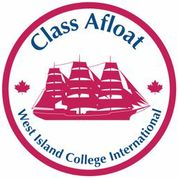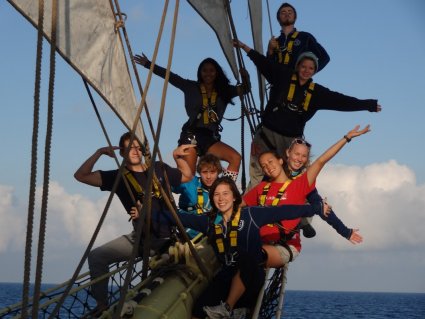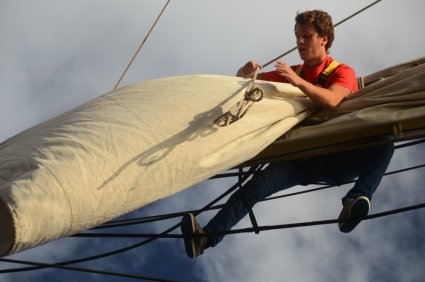Class Afloat 2024-2025 West Island College Canada
Class Afloat partners with Acadia University for post secondary studies. Acadia University is one of Canada's top-ranked undergraduate universities. All academic courses presented aboard the SS Sorlandet are offered via Open Acadia, Acadia University's initiative to offer flexible programming and learning opportunities to Acadia students and the greater community.
Each course meets daily as part of the academic timetable with course facilitators animating discussions, drawing connections to events in ports of call and around the world, and assisting students in understanding material and completing course work. Assignments will be submitted for evaluation by students via email while in port to supervising professors at Acadia.
Students are required to select a minimum of two (2) courses and maximum of 5 courses for each semester they are aboard. Class Afloat recommends choosing three courses per semester in order to reap the maximum benefit from all aspects of the academic and co-curricular programming it offers. None of the courses listed below require prerequisite high school courses - all courses are open to all students, with the exception of Physics 1523 (Physics 1513, offered Semester 1, is the prerequsite).
All students will participate in Class Afloat's unique Cultural Discovery non-credit programme for the full semester or year that they are aboard. All students will also participate in a programme in Physical Education and Fitness (80 hrs) and Seamanship/Navigation (30 hrs) for the full semester or year they are aboard.
Textbooks for university courses are the responsibility of the student as required and may be ordered via the Acadia University Bookstore.
Please Note: All courses listed may not be offered and the school reserves the right to cancel courses which are under-subscribed, which present scheduling conflicts and/or for which no instructor is available.
More information via StudyCanada EU <- click for e-mail
To apply for admission to West Island College International - Class Afloat, you must complete the following steps:
1. Submit the following required items to complete the application:
- Application form plus an application fee of CAN$ 200
- Two personal reference forms and a Personal Resume
- Medical Report
- Essay stating what the applicant hopes to gain from the Class Afloat experience and how he/she expects to contribute to the school community. (300 words maximum)
- Proof of swimming ability: bronze medallion, or equivalent or certified lifeguard's attestation that the candidate can swim 200 meters followed by treading water for 20 minutes
- Academic Transcript
2. Complete a qualifying interview - once your application has been reviewed, you will be contacted by a Class Afloat representative to schedule an interview. The interview is designed to determine your social and emotional readiness for this programme.
3. Acceptance: Upon successful completion of steps 1 and 2, qualifying applicants will receive a letter of acceptance and service contract inviting them to register for the next school year or semester of study.



Class Afloat University Course Selection 2024-2025
The following courses will be offered on board via Acadia University’s distance education department (Open Acadia). Class Afloat University students may choose two or three Open Acadia courses from a list of select Arts and Science courses.
BIOL 2663 - Marine Biology: This course will teach you about the oceans of the world, what lives in them, how they function, how they are important to humans and our impact on them. Everywhere in the ocean, there is life. For all its vastness, the ocean is fragile and humans need to know far more about it before we damage it beyond repair. In this course, you will experience the vastness, study the complexity, and observe the fragility.
COMM 1213 - Communication I: Development of the basic skills needed for effective communications. Communication theory is introduced. Grammar and sentence structure are taught. Emphasis is upon developing an effective, concise, direct writing style. Students also learn the appropriate techniques and formats for writing reports and letters, and how to plan and deliver oral presentations and speak in public.
ECON 1013 - Microeconomics Principles: An introduction to the following questions: How do markets work? When do markets successfully allocate resources? What causes markets to fail and what can be done about it? How do firms make production decisions? What results from firms having market power? In this introductory course, you'll explore how economic agents such as consumers, firms, industries and governments interact in the thing known as the "economy."
ECON 1023: An Introduction to the Study of Macroeconomics - The national accounts. The measurement of macroeconomic indicators. The determination of aggregate employment and output in the short-run, the long-run and the very-long-run. The monetary system and monetary policy. The balance of payments accounts and exchange rate determination. Stabilization policies and policies to promote economic growth. The course will challenge you to think about everyday news from an economic perspective. For example, what exactly is inflation and why is it always in the news? Why does the Canadian dollar fluctuate and how do these fluctuations impact the economy? How do government expenditures or interest rate changes influence economic activity?
ENGL 1413 - Writing and Reading Critically: This course introduces students to novels, plays, and poems from the twentieth century and earlier. This course will develop creative and analytical skills and will provide students with strategies for writing clearly and persuasively.
CODE 1013: Foundations of Leadership Theory and Practice - A theoretical and experiential investigation of leadership and group dynamics for professional and voluntary settings. Emphasis is given to the application of theory for effective leadership of groups and organizations within a community development context. In this course, you'll explore both the theory and practice of leadership with the goal of becoming a more effective and self-aware leader.
NUTR 1503 - Contemporary Issues in Nutrition: The basis of food selection for health. The course stresses evaluation of personal nutrient intake, especially carbohydrate, fat, and protein in relation to needs for active living, weight management, and chronic disease prevention. Issues will be discussed within a contemporary context.
PSYC 1013: Introduction to Psychology – Experimental Area - An introductory survey of psychology with emphasis on basic processes, including perception, learning, biological bases of behavior, cognition, and basic research methods.
SOCI 1033 - Introduction to Sociology: Social Problems: This course introduces sociological concepts, principles and approaches through a focus on social problems in contemporary societies. Problems to be explored include but are not limited to: consumerism, population growth, hunger, poverty, economic development, environment, disease, indigenous groups and ethnic conflict, peasant protests and resistance, intimate violence, drug use, immigration, and sexual.
Tuition fee 2024 - 2025:
CAN$ 47,500 Single Semester
CAN$ 62,500 Full Year


